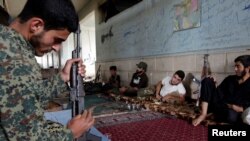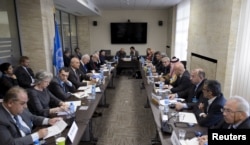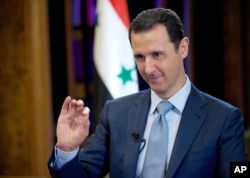Syrian rebel commanders and opposition politicians concede their armed revolution against President Bashar al-Assad can’t win, thanks to the military intervention by Russia and Iran. But, they insist, neither can the regime wipe them out and end the rebellion.
The violent standoff has in effect led to a de facto partition of the war-wracked country with no signs of a political solution on the horizon to stitch Syria together.
Behind the scenes, U.S. diplomats are pressuring rebel negotiators to agree to form a transitional government with President Bashar al-Assad. Rebels dismiss the suggestion out of hand.
“That is just not going to happen — it is wasted breath,” a member of the rebels’ High Negotiations Committee, or HNC, told VOA. “Assad is our red line — and unlike President Obama when it came to his red line on the regime’s chemical weapons use, we won’t cross it,” he added.
Division between parties kills talks
The third round of Geneva-based talks aimed at ending the six-year war in Syria ground to a halt last month with the government and opposition still divided over fundamental issues — the most fundamental being the fate of President Assad.
The opposition suspended participation after the regime’s delegation refused to discuss the formation of a transition council, instead arguing that opposition representatives should be folded into the government without displacing Assad.
The United Nations has set a deadline in August for a transitional government to be formed, but Western diplomats concede this is just not realistic.
“Everybody is holding their breath, hoping that something will be conjured out of the Geneva hat,” a European diplomat told VOA. “But the process has utterly stalled and the opposition is just not going to agree to join Assad in a transition government. Rightly they’re asking transition to what?” he added.
Last week, France’s foreign minister said the major world powers had agreed to push for a resumption of the Syrian peace talks in Geneva by the start of June. “The objective remains the political process,” said Jean-Marc Ayrault. U.N. Syria envoy Staffan de Mistura has said while there’s urgency to get another round of talks going quickly, no firm date has been set.
Keeping the conversation going
Ideas to keep some dialogue going have included forming a new governing council made up of regime military officials and moderate rebel leaders.
Another idea raised is to distribute some of the Syrian president’s powers to super-deputies. But nothing is breaking the deadlock and exasperated Western diplomats admit the main objective of the peace process now is just to keep dialogue going on the grounds that even proximity talks hold out hope for something to give.
“We are going round and round in circles revisiting the same issues time and again. It is like being actors in the Jean-Paul Sartre play Huis Clos [No Exit],” said a Western official, who asked for anonymity. The Syrian regime and the opposition delegation have not even talked face-to-face, but via the U.N., with de Mistura acting as a go-between.
Much of the attention now is getting a fourth round under way but de Mistura said that it “will only be meaningful,” if violence drops to the level it was in the immediate weeks after a cessation of hostilities deal was agreed in February by the regime (and its overseas backers) and the main opposition. Jihadist groups Jabhat al Nusra and Islamic State are not included in the deal. But the level of violence has increased inexorably with both sides accusing each other of major violations.
Regime airstrikes both by Syrian Air Force warplanes and Russian jets have continued remorselessly. The regime insists it is pounding only ‘terrorists’ but moderate rebel and civilian infrastructure, including hospitals and clinics, have been targeted.
Russia has been pushing for major Islamist groups such as Ahrar al-Sham to be excluded from the talks.
Still don’t understand Assad
“The armed revolution can’t win,” said General Salim Idris, the former chief of staff of the mainstream rebel military alliance, the Free Syrian Army. “But neither can the regime, unless the Russians mounted a ground intervention and throw in more than just their Special Forces,” he added. Even then, he said, the rebels would maintain an underground war. He said the Americans have been pressuring opposition negotiators to accept that Assad should stay in a transition government.
“They still don’t understand Assad,” he said.
Among the anti-Assad opposition movement as whole — armed rebels, opposition politicians, and civil society activists — Assad remaining is a deal-breaker. “We don’t know how this conflict will end,” said Bassam al-Kuwatli, a prominent activist, “but one thing we do know is that it won’t end with Assad still there.”
As the war prolongs, the fatigue and desperation of Syrian refugees in Turkey is growing. Many of the educated, especially the young, have left for the West or are planning to. “It is not a life just waiting,” said Raja Banout, an activist. “Most people are trying to find a way to leave. They want a life and there is no life here. What can we do here?”
She said the consequences for a post-Assad Syria will be enormous with the departure to the West of so many Syrians. “Once there they will make a life for themselves and many, maybe half, won’t return to Syria, I suspect.”
*Follow Jamie on Twitter - @jamiewrit






